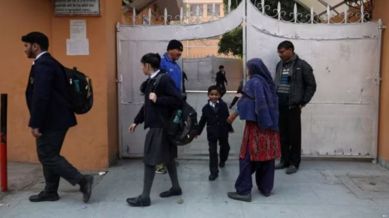Stay updated with the latest - Click here to follow us on Instagram
Delhi govt set to table draft Bill to regulate school fee. Here’s why parents groups oppose it
Groups such as the Forum for Indian Parents have also said that the Bill allows schools to dominate the regulatory process by controlling the selection of committee members and framing fee components with minimal oversight.

Amid criticism from parents and Opposition, the Delhi government is set to table the draft Bill to regulate fees in private schools in the Assembly as the Monsoon Session starts August 4. The Bill, however, has drawn criticism from parents and activists, who say the proposed framework lacks transparency and gives disproportionate control to school managements.
The Delhi School Education (Transparency in Fixation and Regulation of Fees) Bill, 2025, has been circulated to members of the Delhi Legislative Assembly, with copies in Hindi and English versions, according to the Legislative Assembly Secretariat’s circular dated August 1. “The Delhi government will table the Bill to regulate fee hike by private schools, in the Monsoon session of Assembly beginning from August 4,” Chief Minister Rekha Gupta told reporters on Saturday.
monthly limit of free stories.
with an Express account.
The 13-page Bill outlines a new system to govern how private schools in the National Capital Territory fix and revise fees. The stated aim is to prevent profiteering in line with the National Education Policy (NEP), 2020.
Violations by schools such as charging unapproved fees could attract penalties ranging from Rs 1 to 10 lakh, with provisions for refund of excess fees within 20 working days. The Bill also prohibits coercive practices like striking names off rolls or withholding exam results over non-payment. Every such violation carries a Rs 50,000 penalty per student.
Every private unaided school, the Bill mandates, must form a School Level Fee Regulation Committee each year by July 15. This committee is to include the school principal, a nominee of the school management, three teachers and five parents drawn by lottery from the Parent-Teacher Association, and a nominee from the Directorate of Education.
The school management will propose a fee structure for a block of three academic years, which the committee must review and approve by September 15.
If the committee fails to decide the fees within the timeline, the matter is referred to a District Fee Appellate Committee, which includes education officials, a chartered accountant, two school representatives, and two parent members. Further appeals may be taken to a Revision Committee constituted by the government
A key concern among parents is the provision that only a group comprising at least 15% of total parents in the affected class or school may file an appeal before the District Fee Appellate Committee. This Clause, defined under Section 2 of the Bill, raises the threshold for raising grievances and has been widely criticised.
Groups such as the Forum for Indian Parents have also said that the Bill allows schools to dominate the regulatory process by controlling the selection of committee members and framing fee components with minimal oversight. It also raised concerns about the absence of provisions for audits, the selection of parent and teacher members through internal processes, and the broad language of Section 8 that allows inclusion of all forms of surplus and capital expenditure, including litigation costs and penalties, as fee components.
“The BJP-led Delhi government has colluded with private schools, effectively handcuffing Delhi’s parents through the 15% clause,” alleged Mahesh Mishra, a parent at DPS Dwarka and a member of a Delhi-based parents’ group. “There is no provision for Comptroller and Auditor General (CAG) audits, which is essential for financial accountability.”
The Bill outlines a broad set of heads under Section 8 that schools can factor into their fee proposals, including infrastructure, staff salaries, “reasonable revenue surplus”, and “capital expenditure”. Critics have argued that this opens the door for schools to include luxury expenses and litigation costs as part of the fee burden on parents.
The Forum added that the Bill weakens existing provisions requiring prior approval from the DoE for fee changes in schools situated on government land. Under the proposed system, approval rests with school-level committees, which they argue can be influenced by the management.
“This Bill is not just anti-parent,” Mishra said, “it’s a direct attack on the middle class and will make quality education even more inaccessible.”
Lawyer and child rights activist Ashok Agarwal echoed similar concerns. “The Bill is totally confusing and unworkable. So many layers of committees means no end to controversies and litigations,” he posted on X.
Ahead of the start of the Monsoon session, AAP Delhi state president Saurabh Bharadwaj has also slammed the Bill as a “bonanza for private schools” and a “direct assault on parents,” alleging that it empowers school managements while silencing dissent. “When even one parent could earlier raise concerns, why create a threshold of 450 parents in a school of 3,000?” Bharadwaj asked, while flagging the removal of the audit provision, despite earlier government claims of auditing private schools.
The Monsoon Session will be the third session of the Delhi Assembly under the Rekha Gupta-led government.
What the Bill mandates for schools
- Rs 1-10 lakh fine for unapproved fees, refund provision in 20 working days
- Rs 50,000 penalty per student for coercive practices like striking off names off rolls, withholding results over non-payment
- Mandatory to form School Level Fee Regulation Committee every year by July 15 with Principal, a management nominee 3 teachers, 5 parents drawn by lottery, a DoE nominee
- Fee structure for a block of 3 academic years to be proposed
- Committee to approve fee structure by Sep 15
- If deadline not met, matter to be referred to District Fee Appellate Committee
- Further appeals may be taken to a Revision Committee constituted by govt